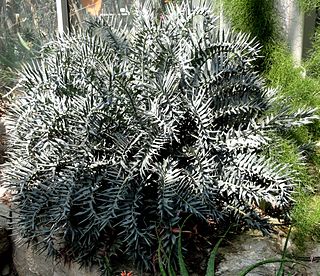
Encephalartos horridus, the Eastern Cape blue cycad, is a small, low-growing cycad up to 0.9 m (3.0 ft) high and 0.9 m (3.0 ft) wide. It is a native of Eastern Cape Province, South Africa, and found in arid shrublands, most commonly on ridges and slopes with shallow soils. The species is particularly known for its distinctly blue-gray leaves, although the degree of coloration can vary significantly. The species name horridus is Latin for 'bristly', after the plant's stiff, spiny leaflets.

Encephalartos villosus is a South African cycad occurring from the East London vicinity, where it is found near the coast, to the northern border of Eswatini (Swaziland) where it may grow as far as 100 km inland. The species is common throughout its range and is the most frequently cultivated in Southern Africa, largely because of its affordable price. As a result of its large geographical distribution, it is notably variable in leaf and cone shape.

Encephalartos whitelockii is a species of cycad that is native to Uganda.

Encephalartos pterogonus is a species of cycad that is native to Mount Mruwere and adjacent mountains in the Manica province of Mozambique.

Encephalartos paucidentatus is a species of cycad.

Encephalartos gratus is a species of cycad that is native to Malawi and Mozambique.
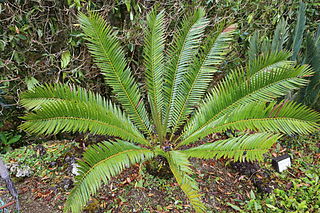
Encephalartos equatorialis is a species of cycad that is found on two granite hills on the eastern shore of Thurston Bay, Lake Victoria, Uganda at elevations up to 1000 meters.

Encephalartos concinnus is a species of cycad in the family Zamiaceae. It is endemic to Zimbabwe. It is known as the Runde cycad.

Encephalartos arenarius is a species of cycad in the family Zamiaceae. It is endemic to South Africa, where it is limited to the Eastern Cape. Its common names include Alexandria cycad and dune cycad.

Encephalartos kisambo is a species of cycad in the family Zamiaceae. It is known as the Voi cycad.
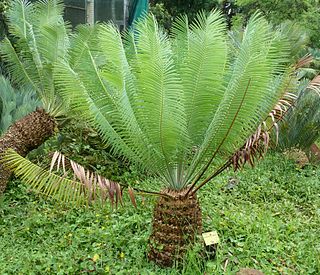
Encephalartos inopinus is a species of cycad that is native to Limpopo Province, South Africa.

Encephalartos hildebrandtii is a species of cycad in the Zamiaceae family. It is native to Kenya and Tanzania at elevations from sea level to 600 metres (2,000 ft). The species is named for the German explorer Johann Maria Hildebrandt.
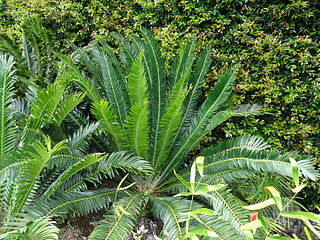
The Chimanimani cycad is a species of cycad that is endemic to the Chimanimani Mountains of eastern Zimbabwe. It is a threatened species which has been locally extirpated by cycad collectors.
Encephalartos macrostrobilus is a species of cycad in Africa. It is found only in Moyo District, northwestern Uganda, which is populated predominantly by the ethnic Madi.

Encephalartos aplanatus is a species of cycad in Eswatini.
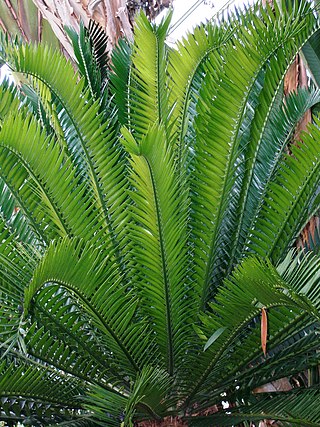
Encephalartos bubalinus is a species of cycad in Kenya and Tanzania.

Encephalartos cerinus or Waxen Cycad is a species of cycad in Africa.
Encephalartos heenanii is a species of cycad in Southern Transvaal Province, South Africa.

Encephalartos lanatus is a species of cycad, a plant belonging to the family Zamiaceae growing in Mpumalanga, South Africa. Its specific epithet, lanatus, means wooly in Latin.

Encephalartos ngoyanus is a species of cycad in Ngoye Forest, in KwaZulu-Natal, South Africa.



















